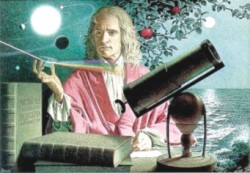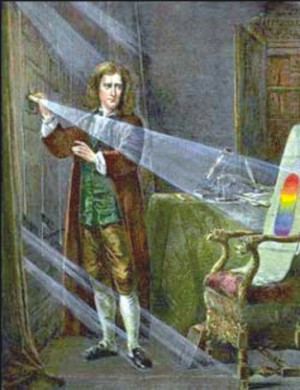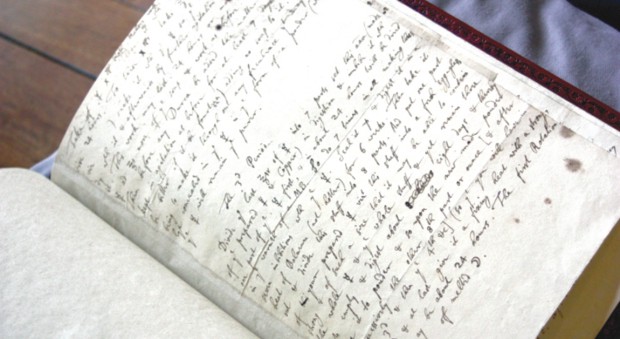| Home - Back Issues - The Team - Contact Us |
 |
| Volume 10 |Issue 14 | April 08, 2011 | |
|
|
History The Esoteric World of Sir Isaac Newton Obaidur Rahman
Three months after the death of his father who was also named Isaac Newton, a prosperous farmer, Sir Isaac Newton Jr. was born on January 4, 1643 as per Gregorian calendar which we follow today or otherwise on the very Christmas day of 1642 in Woolsthrope, near Grantham, Lincolnshire. Born prematurely, the baby Newton was a sickly, small child who, according to his mother Hannah Avscough, would have easily fitted inside of a quart mug. Grew up to be awkward, quarrelsome, distant, unpleasant and notoriously egocentric, the young Newton spent his schooling years at The King's School, Grantham from age 12 to 17 which was neither inspiring nor challenging for his calibre of intellect. In 1661, he was admitted to the Trinity College, Cambridge where, despite the institution's Aristotelian approach of education, Newton preferred to be enlightened by the works of philosopher like Descartes and astronomers with the likes of Copernicus, Galileo and Kepler. In 1665, at the age of 23, Isaac Newton discovered Differential Calculus and generalised Binomial Theorem. Despite his modest years in Cambridge, Newton extensively worked in his private studies where he devoted his hours on discovering theories regarding calculus, optics and of course gravity. In 1667, he was elected a Fellow of Trinity College and a Lucasian Professor of Mathematics in 1669. In 1687, Newton published Philosophiae Naturalis Principia Mathematica (Mathematical Principles of Natural Philosophy), which is considered the single most influential book ever written on physics. It is in this very book (interestingly, the thoughts of which were spent in the years 1665-1666, when the noted scientist spent largely in Lincolnshire because of the plague in Cambridge) where he talked decisively on laws of motion, classical mechanics, Kepler's laws on planetary motion and obviously the law of universal gravitation. In 1699 he became the Warden of the Royal Mint, the president of the Royal Society of London in 1703 and was knighted in Cambridge in 1705. Sir Isaac Newton, virgin to the day he died, passed away in his sleep at age 84, in London on 31st March, 1727. After his death, it was found that his body had massive amounts of mercury in it and the initial explanation was that it was most likely due to his experiments with elements of chemistry in his laboratory. But it was only in 1936, that it was resolutely realised that what was thought to be Newton's chemistry experiment was in fact the practice one of far more esoteric and astonishingly mysterious aspect of knowledge, the great numinous art of Alchemy and other ancient mystical wisdom which, according to many, inspired most of his major scientific discoveries at the first place.
It was learnt back in 1936 that a collection of Sir Isaac Newton's unpublished papers were auctioned in Portsmouth and in them included three hundred and twenty-nine lots of Newton's manuscripts, over a third of which are filled with his writings that were exclusively alchemical in nature. At this point it must be understood that contrary to the popular belief that alchemy (going strong for over 2,500 years) is all about turning matters into gold, this ancient practice is in fact the quest of achieving the ultimate spiritual wisdom and the persuasion of heavenly illumination of the human soul. The stanch secrecy of the practise which involves the ancient of ways is what makes the philosophical systems of alchemy a deeply mysterious one. The true nature of this particular alchemical writings of Newton is believed yet to be revealed as many feared deeply that if the secret contents were to be exposed it might usher dire consequences to the affairs of the world, a thought shared by Newton himself in his lifetime regarding his all consuming devotion to the esoteric mysticism of various natures. Eventually these papers were bought off by economist John Maynard Keynes (who once stated that “Newton was not the first of the age of reason. He was the last of the magicians”) and document collector Abraham Yahuda. These papers which are referred as the “Portsmouth Papers” are now in the Jewish National and University Library in Jerusalem. It is believed that much of Newton's other writings on alchemy were destroyed in a fire related accident in his laboratory, allegedly started by his dog, diamond, which destroyed 20 years of his research on various aspects of alchemy! But from the analysis of his surviving works, it is understood that most of Newton's alchemical work was centred on The Philosopher's Stone (the very Nicolas Flamel's Philosopher's Stone that the first fictional stellar series of Harry Potter is plotted around) which is often associated with the Elixir of Life, the legendary magical potion that grants eternal youth. But it was not only the alchemy that Newton was all consumed in for his deep passion with regard to mysticism and spirituality. Sir Isaac Newton, a deeply religious man, studied the Bible extensively and with faithful efforts and made numerous attempts to extract and decipher hidden messages and scientific information from Bible. And in 1704, in a manuscript he estimated that the world will come to an end around 2060. But many scholars believe that Newton, with his Aryanism and Anti-Trinitarianism stance, was, in this regard, actually referring to a time when the restiveness of the World was to be replaced by an era of divinely inspired peace and stability. In 1728, Isaac Newton penned down an extensive manuscript titled “The Chronology of Ancient Kingdoms” concentrating on various ancient Eurocentric kingdoms focusing on Greece, Anatolia, Levant and also Egypt, which many belief was an effort initiated by Newton to understand the ancient occult practises and mysticism studies. In this particular manuscript Newton, dedicated an entire chapter on the Temple of Solomon reflecting his original interest in the temple's sacred geometry but as he studied more on the architectural components of the ancient temple his original interest graduated to a genuine belief that the geometry and the mathematical structures of the temple were in harmony with the size of world and man's place and proportion to this beautiful blue planet. Newton believed that the works of ancient philosophers and scholars were embedded with mystical and sacred wisdom hidden in the language of symbols and mathematics which, if and when deciphered, would reveal a mysterious yet uniquely powerful knowledge regarding the magical elements and the supremacy of nature. Rumour has it he was successful in this particular quest of his. In the same manuscript of the Ancient Kingdoms, Newton wrote several passages on the mythical land of Atlantis expressing his belief that Homer's Ulysses left the island of Ogygia in 896 BC (Ogygia was the home of Calypso, the daughter of Greek God Atlas, after whom the legendary land was named) along with the thought that Ogygia and Atlantis were geographically connected.
Throughout his entire life, Sir Isaac Newton was believed to have been involved with numerous powerful secret societies and Gnostic fraternities that are devoted to the ancient practise of occults and esoteric understandings. One such society was Rosicrucian, a philosophical ultra-secret society founded in the late medieval Germany which's doctrine revolved around knowledge “built on esoteric truths of the ancient” which provides great insight into the nature, the physical Universe and the wondrous realm of spirituality. Aside from analogous alchemical spiritual systems, it is believed one of the aspects that attracted Newton to this society is their exclusive ability to communicate with Angels and the spirit world (presumably) which many scholars believe coincided with Newton's visionary belief systems. It is also believed that Sir Isaac Newton was a freemason of highest degree as well as a member of the controversial fraternal organisation Priory of Sion, the secret society founded in 1099 AD, allegedly to protect the bloodline of Jesus Christ. Despite his unpleasantness and lifelong dedication to the esoteric mysticism, Sir Isaac Newton was a gifted individual who understood the grandeur as well as the obscurity of the Universe with great deal of precision as well as admiration. We live in a world where much of its affairs are vaguely understood, let alone the enigmatic ways of the whole Universe. Mankind surely has a long way to go and Newton realised it very well. This is what he wrote before his death, “I do not know what I may appear to the world; but to myself I seem to have been only like a boy, playing on seashore, and diverting myself, in now and then finding a smoother pebble or a prettier shell than ordinary, while the great ocean of truth lay all undiscovered before me”.
Copyright
(R) thedailystar.net 2011 |
 U
U
